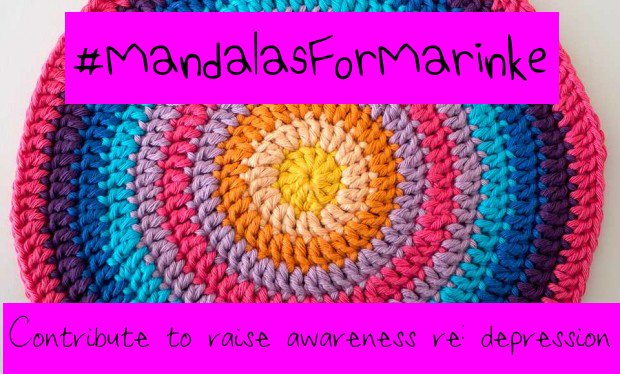
Here is the next of the beautiful, inspiring, special contributions coming in to the #MandalasForMarinke remembrance project. I am grateful for each and every amazing contribution.
Contributions should be postmarked by October 15, 2015. Learn more here. If you absolutely can’t meet that deadline but want to participate, please email me at kathryn.vercillo (gmail).
Beautiful Crochet Mandala
This is Wink’s standard 12 round crochet mandala pattern. I love the progression of the colors, with a different color on each round, coming together at the end with the rainbow variegated yarn for the border.
Meet the Maker
Maker Jay Henderson shares:
“I am a 55 year old double amputee paraplegic. I chose to participate in this project because I have suffered from depression for over 35 years. I started crocheting four years ago and found that besides keeping me busy, the creativity and productivity help me to feel good about myself.”
Jay sells crochet items at Quickmaile Crochet, sharing there:
“I live in a long term care facility, all income goes back into buying more yarn and craft accessories like noses, eyes and needles for sewing stuffed animals together. The Quickmaile company has been doing hand crafts since the mid 80’s, doing leather crafts, cross stitch, latch-hook, candle making, chainmaile armor and items.”
Words by Wink
Wink reminded us one day on Instagram:
“Slow progress is still progress.“
About Depression
One purpose of this project is to raise awareness about depression so each post ends with some facts, thoughts or quotes about depression, suicide and/or mental health. This week is Mental Illness Awareness Week and the theme is about being stigma free. I wanted to highlight how one of the problems with the stigma of mental illness in America is that people with mental health issues often end up in marginalized portions of society.

The above graphic, which is a portion of a larger informative infographic from NAMI, shows that approximately one in every four people in homeless shelters have a serious mental illness and the same is true of prisoners in the United States, plus there’s a big overlap of substance abuse issues in people who have mental health issues. If we reduce stigma and increase resources for actually treating mental illness, including depression, then we can reduce these numbers.
Regarding mental health in American jails prisons, a 2006 Special Report showed:

The 2014 Federal Bureau of Prisons guidelines for managing major depression specifically warns:
“STIGMA can be a major barrier to the expedient diagnosis and treatment of mental disorders and may be particularly important within the institutional environment. Inmates on psychiatric medications often must attend pill line where they may be observed by other inmates and consequently labeled as “crazy” or viewed in a derogatory manner.”
All contributions to Mandalas for Marinke are so appreciated. They help raise awareness about depression while honoring her work in the same way that this great contribution has done today.





1 comment
Comments are closed.